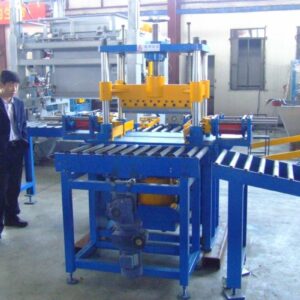Block making machines are designed to handle interruptions or disruptions during operation in several ways to minimize downtime and maintain productivity:
- Safety Features: Block making machines are equipped with safety features such as emergency stop buttons, safety guards, and sensors to detect anomalies or hazards. In the event of an interruption or disruption, operators can quickly activate the emergency stop mechanism to halt machine operation and address the issue safely.
- Fault Detection Systems: Many block making machines are equipped with fault detection systems that monitor machine performance in real-time. If a fault or malfunction is detected, the system can automatically pause operation, alert operators to the problem, and provide diagnostic information to facilitate troubleshooting and repairs.
- Automatic Reset Functions: Some block making machines feature automatic reset functions that enable the machine to resume operation after an interruption or disruption once the issue has been resolved. This helps minimize downtime and streamline the restart process, ensuring efficient operation and productivity.
- Manual Override Capability: Block making machines may include manual override capabilities that allow operators to bypass automated functions and manually control machine operation in the event of a disruption. block making machine for sale in usa Manual override features enable operators to troubleshoot problems, make adjustments, or perform maintenance tasks as needed to restore normal operation.
- Backup Power Systems: In facilities with unreliable power sources or frequent power outages, block making machines may be equipped with backup power systems such as generators or battery backups. These backup systems can provide temporary power supply during interruptions or disruptions, allowing machine operation to continue uninterrupted until primary power is restored.
- Remote Monitoring and Control: Some block making machines offer remote monitoring and control capabilities that enable operators to monitor machine performance, diagnose issues, and make adjustments from a remote location. Remote access allows operators to respond to interruptions or disruptions quickly, even if they are not physically present at the machine.
- Preventive Maintenance Programs: Implementing preventive maintenance programs can help reduce the likelihood of interruptions or disruptions during machine operation. Regular maintenance activities, such as lubrication, cleaning, and inspection, can help identify and address potential issues before they escalate into major problems, minimizing unplanned downtime and maximizing machine reliability.
- Operator Training and Support: Providing comprehensive training and support to machine operators can help them effectively manage interruptions or disruptions during operation. Well-trained operators are better equipped to troubleshoot problems, follow safety protocols, and implement contingency plans to minimize downtime and maintain productivity in the event of disruptions.
Overall, block making machines are designed with various features and strategies to handle interruptions or disruptions during operation, including safety features, fault detection systems, automatic reset functions, manual override capabilities, blocks machine price backup power systems, remote monitoring and control, preventive maintenance programs, and operator training and support. By implementing these measures, manufacturers can ensure efficient and reliable operation of block making machines and minimize the impact of interruptions on productivity and profitability.
How does a blocks machine minimize waste and maximize efficiency in brick production?
A blocks machine can minimize waste and maximize efficiency in brick production through several strategies and features:
- Optimized Material Usage: Blocks machines are designed to minimize material waste by efficiently utilizing raw materials such as concrete, cement, aggregates, and additives. Precise dosing and mixing mechanisms ensure that the correct proportions of materials are used, reducing overconsumption and minimizing waste.
- Customizable Production: Many blocks machines offer customizable production options, allowing manufacturers to produce bricks in various sizes, shapes, and designs according to specific project requirements or customer preferences. By tailoring production to meet exact specifications, manufacturers can minimize waste associated with excess or unused inventory.
- On-Demand Production: Blocks machines can facilitate on-demand production of bricks, allowing manufacturers to produce only the quantity needed for immediate use or customer orders. By avoiding overproduction and excess inventory buildup, on-demand production minimizes waste and maximizes efficiency in brick manufacturing.
- Quick Changeover Features: Blocks machines may incorporate quick changeover features that enable rapid transition between different brick sizes, shapes, or colors. By minimizing downtime associated with changeovers, manufacturers can optimize production efficiency and responsiveness to changing market demands, reducing waste and maximizing resource utilization.
- Recycling and Reuse of Waste Materials: Some blocks machines are capable of processing recycled or reclaimed materials, such as crushed concrete, construction waste, or industrial by-products, into bricks. By incorporating recycled materials into brick production, manufacturers can reduce waste disposal costs, conserve natural resources, and promote sustainability in manufacturing operations.
- Energy Efficiency: Blocks machines are designed to operate efficiently and consume minimal energy during production. Energy-efficient motors, cinder block maker automated controls, and optimized production processes help minimize energy consumption and reduce operating costs, maximizing efficiency and sustainability in brick manufacturing.
- Quality Control Mechanisms: Blocks machines incorporate quality control mechanisms to ensure consistent brick quality and performance. Automated monitoring systems, sensors, and inspection processes help detect defects or deviations from quality standards, allowing manufacturers to identify and address issues promptly to minimize waste and rework.
- Lean Manufacturing Principles: Many blocks machines are designed based on lean manufacturing principles, which emphasize continuous improvement, waste reduction, and efficiency optimization. By implementing lean practices such as value stream mapping, process optimization, and continuous monitoring, manufacturers can identify opportunities for waste reduction and efficiency improvement in brick production.
Overall, blocks machines can minimize waste and maximize efficiency in brick production by optimizing material usage, offering customizable production options, facilitating on-demand production, incorporating quick changeover features, recycling and reusing waste materials, ensuring energy efficiency, implementing quality control mechanisms, and adhering to lean manufacturing principles. By adopting these strategies and features, manufacturers can enhance sustainability, profitability, and competitiveness in the brick manufacturing industry.
